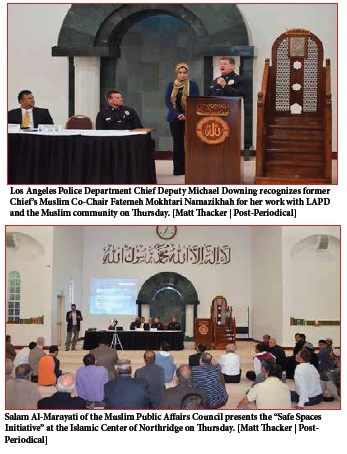Islamic Center Reaching Out to Community
By Matt Thacker
news@postperiodical.com

The San Fernando Valley’s largest Muslim community hopes to build a stronger relationship with law enforcement while changing negative perceptions some may have about their religion.
The Islamic Center of Northridge hosted a forum Thursday evening with the Los Angeles Police Department at the Granada Hills mosque. The event follows a series of meetings between the leaders of the Islamic Center and the LAPD Devonshire Division.
Ehsan Khan, an Islamic Center spokesperson, said the meetings represent a first step toward understanding between the two organizations.
“We want to work closely with [LAPD] so they understand that we exist, and if anything goes wrong, they can ask us for help,” he said. “We’re trying to show the LAPD and other law enforcement agencies that we’re law-abiding citizens.”
Both sides have seen the importance of communication and a positive working relationship. Two years ago, a 19-year-old Muslim man was killed by police during a pursuit in Northridge. The incident led to accusations of ethnic prejudice.
“At that time, we tried to help calm down the community because we understood the situation and understood the role of LAPD. Luckily since then, we haven’t had any problems,” said Manzar Qureshi, secretary for the Islamic Center.
LAPD Deputy Chief Mike Downing praised local Muslims for their charity work and said the key is integration in society.
“You’ve had a somewhat difficult path in the past, but because of your persistence, commitments and leadership, you overcame some of those challenges, and we’re very proud to be your partners,” Deputy Chief Mike Downing told the attendees. “As police officers, we protect the sacred texts of the great religions of the world, and Islam is a great, peaceful religion of the world.”
The Islamic Center serves an estimated 10,000 to 20,000 people, but after years of negative attention, leaders understand people still have questions. A power struggle within the local Muslim community led to an ugly court battle and public protests. A judge ordered elections in 2012 to determine who would sit on the board of directors.
Qureshi said it’s important that they educate people about what they do. He said they try to attend interfaith services and neighborhood council meetings, and they invite non-Muslims to visit their mosque.
“If anyone has any reservations or fears, they can come in and see. That will bring the community together,” he said.
During the Christmas and New Year’s holiday period, they gave out small gifts and cards to their neighbors. Qureshi said they received a positive response for the gesture.
Salam Al-Marayati, founder and executive director of the Muslim Public Affairs Council, believes Muslim-Americans will eventually be able to control their own narrative. However, he knows they need to tackle violent extremism within their community.
At Thursday’s forum, he discussed the “Safe Spaces Initiative” – a report his organization released last month encouraging a more proactive approach to preventing terrorism. He will present the report in Washington, DC, this month.
The initiative includes a three-tiered approach – preventing extremist ideology, intervening when individuals display signs of depression or violence and then ejecting that person from the community and contacting police when intervention does not help.
“Our job is to educate and rehabilitate anyone who may have a problem whether it’s a problem involving depression or isolation or alienation,” he said. “We can’t just arrest our way out of this problem. We have to deal with it before it becomes a problem that is out of control.”
The report calls for each mosque to form a crisis intervention team involving religious leaders, social workers, mental health counselors and trusted law enforcement officers.
The shooting at the Fort Hood military base in Texas was a reminder for the Muslim community that they have a perception problem. Numerous attendees expressed relief that the shooter was not Muslim even as they reject the notion that they should be held responsible for extremists.
“They don’t represent us. They’re hijacking our religion. We’re trying to reclaim our religion,” Khan said. Courtesy Post-Periodical

